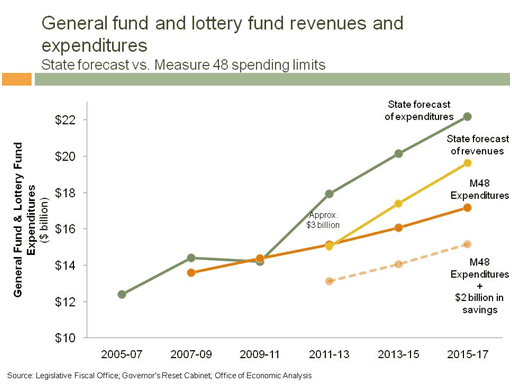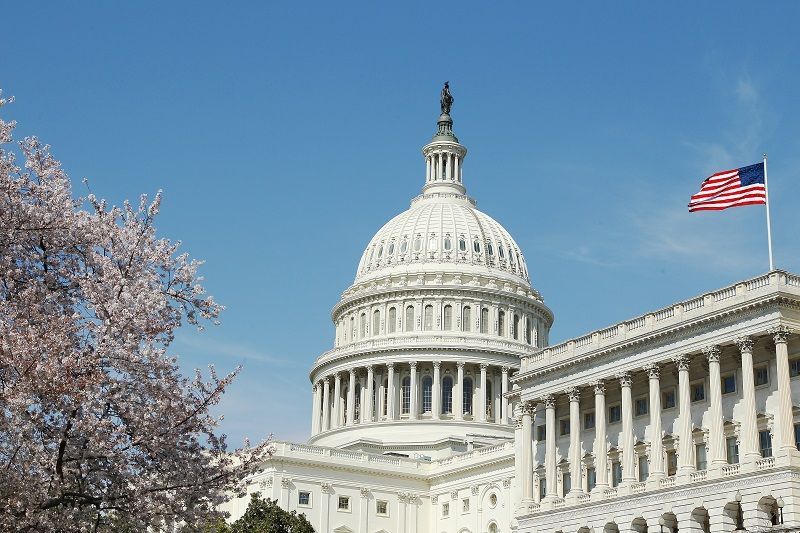Resetting Oregon’s Budget and Recharging Our Economy
by Steve Buckstein
Oregon voters didn’t go as far as voters nationally this month turning out incumbent politicians, but we did replace a number of big-government state legislators with more fiscally conservative ones.
Reducing government spending is a big issue nationally, and a virtual necessity in Oregon due to our balanced budget requirement. Cascade and Americans for Prosperity-Oregon published our answer to this challenge last month in our report, “Facing Reality: Ideas to Reset Oregon’s Budget and Recharge its Economy.”
Oregon’s fiscal crisis can be more of an opportunity than a crisis if our state government is “reset” using the time-tested principles of limited government and pro-growth economic policies. We call for Reality Based Budgeting, which in part means rejecting the notion that budget deficits are determined by subtracting expected state revenue from wished-for state spending. We therefore reject the common wisdom that says we face a $3.2 billion budget deficit in the next biennium. That is true only if wished-for state spending is our goal. It should not be.
Decades of well-meaning politicians, bureaucrats and special interests have grown state government spending without regard for long-term consequences, producing an unsustainable budgetary premise that threatens Oregon’s financial stability.
Outgoing Governor Ted Kulongoski acknowledged this fiscal reality when he formed his “Reset Cabinet” in 2009. While we agree with some of its recommendations, it does not address ideas for economic growth. Any policy to restructure state spending must be accompanied by proven concepts to grow the private sector economy, as this is the most reliable manner to ensure long-term state budget stability.
Unfortunately, the demonization of corporations and small businesses during the debate over Measures 66 and 67, along with proposed regulations and higher state fees, has reinforced the impression that Oregon is not business-friendly. This must be addressed immediately if long-term investments in expanded business capacity are to occur.
In “Facing Reality” we identify some $2 billion in cost savings and enhanced revenue during the next biennium from four general categories:
- Privatization and Investment (Sale or lease of the Elliot State Forest; Privatize liquor distribution and sales; Privatize motor vehicle registration and emissions inspections)
- Reduced Corrections Costs (Reduce cost of housing state corrections inmates down to the national average and privatize the Oregon Youth Authority)
- Transfer payments and tax credits (Eliminate the Business Energy Tax Credit [BETC] program; Eliminate Building Opportunities for Oregon Small Business Today [BOOST] program; Eliminate Healthy Kids Connect program)
- Public employee compensation (Eliminate Public Employee Retirement System pick-up; Align state employee compensation with private sector compensation; Remove retirees from general health insurance pool)
In “Facing Reality” we recognize that voters rejected Measure 48 in 2006 (which would have limited spending to population growth and inflation). If they had approved it, expected state revenue and allowed state spending would be roughly in balance in 2011-13. We call for enacting such a sensible limitation now. The chart below shows how the future looks with and without it.

Note that without a Measure 48-type limit, the state forecasts that expenditures will grow to $22.2 billion in the 2015-17 biennium, with forecast state General Fund and lottery fund revenues reaching only $19.6 billion, leaving a $2.6 billion budget gap. With a Measure 48-type limit, allowed spending will reach only about $17.2 billion, leaving a $2.4 billion surplus. If, on top of the Measure 48-type limits, the legislature were to enact the $2 billion of “Facing Reality” cuts and revenue enhancements, that surplus grows to nearly $5 billion by 2015-17.
Finally, in “Facing Reality” we argue that one of the best things we could do to recharge our economy is to repeal Oregon’s high capital gains tax. In the recession it has accounted for a small and shrinking percentage of state revenue, yet it is a major deterrent to entrepreneurs from staying here, or coming here with the jobs they create.
If we enact the recommendations in “Facing Reality,” we are convinced that Oregonians will see not a decade of deficits, but a decade of growth and prosperity. We stand ready to help our new legislature and governor in this effort.
Steve Buckstein is founder and Senior Policy Analyst at Cascade Policy Institute, Oregon’s free market public policy research organization.











